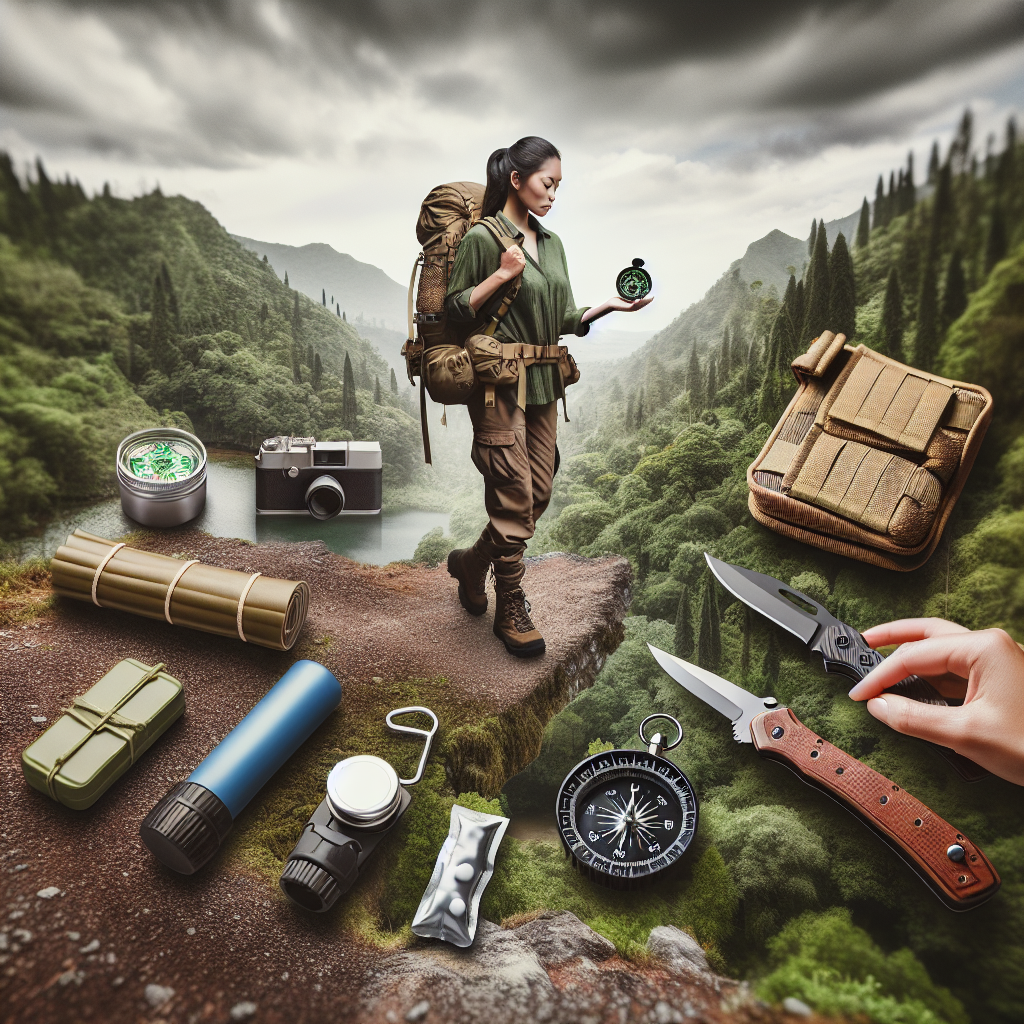Womens Preparedness
"Prepare Like a Girl: The Essential Items Every Woman Needs in Her Bug Out Bag"

Hello my fellow fierce females! Today, I want to talk to you about a topic that is near and dear to my heart – being prepared for any situation. As a women’s self-defense and personal protection expert, I cannot stress enough the importance of having a well-stocked bug out bag ready to go at a moment’s notice. Whether you are facing a natural disaster, civil unrest, or even just a power outage, having the essential items in your bug out bag can make all the difference in your safety and wellbeing.
First and foremost, let’s talk about the bag itself. You want something durable and easily portable, like a backpack or a crossbody bag, that you can grab and go in a hurry. Make sure it is comfortable to carry for long periods of time and has enough compartments to keep your items organized.
Now, let’s get into the essentials that every woman should have in her bug out bag:
1. Water and water purification tablets – Staying hydrated is crucial, especially in emergency situations where clean water may not be readily available.
2. Non-perishable food items – Pack items like protein bars, nuts, and dried fruits that are high in calories and nutrients to keep your energy levels up.
3. First aid kit – Include bandages, antiseptic wipes, painkillers, and any necessary medications in case of injury or illness.
4. Multi-tool – A versatile tool like a Swiss Army knife can be a lifesaver in various situations, from opening cans to fixing equipment.
5. Emergency blanket and extra clothing – Stay warm and dry with a compact emergency blanket and have a change of clothes in case yours get wet or dirty.
6. Flashlight and batteries – A reliable light source is essential for navigating in the dark or signaling for help.
7. Personal hygiene items – Pack essentials like toothbrush, toothpaste, wipes, and feminine hygiene products to stay clean and comfortable.
Remember, your bug out bag should be customized to meet your specific needs and preferences. Consider adding items like a whistle, pepper spray, self-defense keychain, or even a portable phone charger.
Now, let’s look at some real-life examples of women who were prepared and benefited from having a bug out bag:
– Sarah, a hiker who got lost on a trail and used her emergency blanket and flashlight to stay warm and signal for help until rescue arrived.
– Maria, a single mother who experienced a power outage during a storm and relied on her food and water supplies in her bug out bag to feed her children until the power was restored.
– Ava, a college student who was walking home late at night and used her pepper spray from her bug out bag to defend herself against a would-be attacker.
So, my fellow warrior women, I urge you to take the time to prepare and pack your bug out bag with the essential items you need to stay safe and ready for anything that comes your way. Remember, being prepared is not a sign of fear, but a sign of strength and empowerment. Stay fierce, stay safe, and stay prepared! You’ve got this!
Womens Preparedness
Off grid hurricane preparedness. #hurricanemilton #datingtips #offgrid #shower #disastersurvival
Womens Preparedness
Collier County Emergency Preparedness – Volunteering

In the aftermath of #HurricaneIan, communities and neighbors are in need of help. Visit volunteerflorida.org for volunteer …
source
Womens Preparedness
Survival Skills for Women: How to Prep for College Life

Survival Skills for Women: How to Prep for College Life
Hey there, future college students and young women stepping into this exciting new chapter of your lives! As you prepare to transition into college life, it’s essential to equip yourself not just academically, but also with the life skills that will help you thrive both on and off campus. Today, I want to focus on survival skills that every woman should consider—especially when it comes to personal safety, self-defense, and preparedness.
1. Understand Your Environment
Before you even step foot on campus, take some time to familiarize yourself with the area. Make note of the following:
-
Campus Resources: Identify the location of the campus police, health services, and counseling centers. Most universities offer security escorts at night—know how to access this service.
- Surrounding Areas: Research where the nearest grocery stores, pharmacies, and emergency services are located. Getting to know your environment can help you feel more secure.
Real Example: Emma’s Experience
When Emma moved to a large university in a bustling city, she spent a week before classes started familiarizing herself with the campus layout. She attended orientation activities focused on safety, chatted with resident advisors, and even walked the routes she’d take regularly. When school began, she felt confident navigating her new environment.
2. Personal Safety Strategies
Having a personal safety plan is crucial. Here are some strategies to consider:
-
Self-Defense Classes: Sign up for self-defense courses. Many campuses offer classes through student services or local martial arts studios. Techniques taught in these classes can empower you to act decisively in potentially dangerous situations.
- Buddy System: Always try to go out with a friend, especially at night. If you have to go somewhere alone, let someone know your whereabouts and your expected return time.
Real Example: Ava and the Buddy System
Ava learned the value of the buddy system when she almost got lost walking back to her dorm late one night. She was with her roommate, who helped her find her way. They realized that sticking together not only ensured safety but also made for fun nighttime walks.
3. Develop Situational Awareness
Being aware of your surroundings can significantly prevent dangerous situations. Here’s how to enhance this skill:
-
Limit Distractions: When walking around campus or waiting for public transportation, keep your phone away. Paying attention to your surroundings means noticing unusual behavior.
- Trust Your Gut: If something doesn’t feel right, trust that feeling. It’s better to be cautious and leave a situation than to ignore your instincts.
Real Example: Zoe’s Gut Feeling
Zoe was waiting for a bus when she noticed a man acting suspiciously near her. Though she didn’t want to seem paranoid, her gut told her something was off. She decided to walk to a nearby café instead, and later she learned there had been a minor incident reported at that bus stop. Trusting her instincts had kept her safe!
4. Emergency Preparedness
Preparation can make a huge difference in a crisis. Consider having a personal emergency kit that includes:
-
First Aid Supplies: Band-aids, antiseptic wipes, pain relievers, and any personal medications.
-
Emergency Contacts: Keep a list of important contact numbers (friends, family, campus services) in your wallet or bag.
- Self-Defense Tools: Pepper spray or a personal alarm can be useful as protective measures. Ensure you know how to use these items safely and legally.
Real Example: Mia’s Preparedness Plan
Mia created a small emergency kit that she keeps in her backpack. It includes her first aid supplies and a small flashlight for those late-night walks. One night, when her phone died on her way back to the dorm, she was grateful for the flashlight—she could light her way home without feeling vulnerable.
5. Building a Support Network
Connecting with fellow students and building a community is essential for your well-being. Here’s how to foster that network:
-
Join Clubs or Organizations: Getting involved in clubs can help you meet people who share your interests. This connectivity not only enriches your experience but also ensures you always have someone to turn to.
- Engage with Faculty and Advisors: Don’t hesitate to reach out to professors or student advisors. They can provide invaluable support in academics and life guidance.
Real Example: Sarah’s Club Experience
Sarah joined her campus’s women’s empowerment group. Not only did she make friends, but she also participated in workshops on self-defense and safety, allowing her to learn and grow in a supportive environment.
Transitioning to college life can be both thrilling and intimidating, but arming yourself with these essential survival skills can help ease your worries. Remember, you are not alone—you have a whole community of women who share your journey.
As you embark on this new adventure, lace up those hiking boots, pack that emergency kit, and get ready to take on college life with confidence. You’ve got this! Embrace the challenge, and remember that preparedness is empowerment. Here’s to a safe, successful, and fulfilling college experience!
-

 Womens Self Defense10 months ago
Womens Self Defense10 months agoNew Legislation Empowers Women to Defend Themselves
-

 Self Defense News1 year ago
Self Defense News1 year agoShe was convicted of killing her abusive boyfriend. Now a Maple Grove woman is home awaiting a new trial.
-

 Self Defense News1 year ago
Self Defense News1 year agoSelf-Defense for All: The new Gracie Jiu-Jitsu Pasadena is for everyone | Online Features
-

 Womens Self Defense1 year ago
Womens Self Defense1 year agoTop 5 Self-Defense Techniques Every Woman Should Know
-

 Womens Fitness1 year ago
Womens Fitness1 year agoXtreme Bodyweight HIIT (Lots of Jumping!) | Joanna Soh (Fio Series)
-

 Womens Self Defense6 months ago
Womens Self Defense6 months agoUnderstanding State-by-State Variation in Self Defense Laws
-

 Womens Preparedness1 year ago
Womens Preparedness1 year agoThe Importance of Self-Sufficiency Skills in Today’s World
-

 Womens Preparedness1 year ago
Womens Preparedness1 year ago10 essential skills for surviving in the great outdoors


